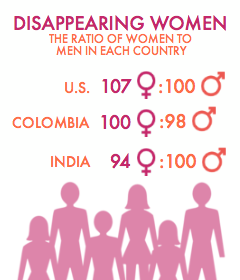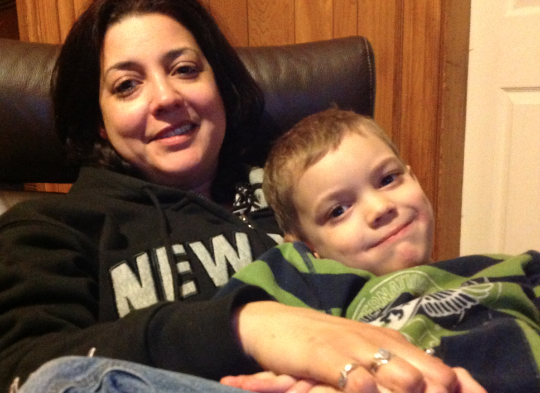
April 15, 2013 | Education, Economic Opportunity
Life on the Brink
Up-close with two women pedaling as fast as they can.

Juggling work, school and motherhood: Norma, with Elvis.
Part 2 of our 3-part series on American women and poverty
by Amanda L. Freeman
Lauretta has lived in Boston public housing all her life. She and her son, Francis, a 7-year-old freckle-faced charmer with bright orange hair, share a ground floor unit in the Old Colony Housing projects.
After her mother died when Lauretta was 17, she earned a GED and worked as a court reporter and in accounts payable, but what she really wanted was to become a mom. "I always fantasized about having a family. I watched the baby carriages, and I secretly couldn't wait until it was my turn," she says.
Who’s helping: Learn about groups that are getting women out of poverty
Click here for part 1 of this series
Once kids come along, say experts, getting additional schooling becomes doubly hard—even though education is the only sure-fire fix for economic despair. "In too many instances, people can't work their way out of poverty, even when they work 80 hours a week in two or three jobs," says LaShawn R. Jefferson, Ford Foundation program officer on women's human rights. Ford is among several organizations dedicated to finding ways relieve poverty among American women. "In today’s economy, graduating from high school and obtaining a post-secondary degree can mean the difference between a lifetime of poverty and a secure economic future."
Francis was born when Lauretta was 29, but his father, who struggled with substance abuse, split soon after. "Having my son was a wake up call," she says.
Friends told her about a local learning center that offered classes for her and childcare for her son. So Lauretta went back to school and eventually started working part-time at a computer center in the neighborhood.
Financial aid covers most of the tuition at Bunker Hill Community College and One Family Scholars, a local nonprofit that supports low-income single parent students, provides a small stipend as long as she keeps her grades up.
Still, money is tight. "I get that sick feeling when I realize he's grown again, and I can't afford sneakers or a new coat."
Lauretta is now in her fourth year of an associate's degree program, planning to graduate in the spring. Because single moms are often the primary breadwinner, housekeeper and parent, they tend to take longer than fresh-from-high-school coeds to finish degree programs.
Although she's excited to start her full-time job search, Lauretta also has worries about leaving public housing. "It's my goal to move out of here, but it's also scary because you lose your safety net," she says.
"I always had a job. Two jobs, really."
Nobody understands Lauretta's concerns better than Norma and her six-year-old son, Elvis, who moved out of the same Old Colony Housing development two years ago.
When they first arrived at Old Colony, Elvis was three. Fleeing an abusive relationship with Elvis' father, mother and child stayed with relatives and wound up in a domestic violence shelter before the transfer to public housing. "I'd never lived in public housing and literally always had a job, two jobs really, so all this was new to me. But I got food stamps. Got Elvis a voucher for daycare. I was so grateful for the help, but I knew it was temporary," she says.
With 15 years of experience in medical billing, Norma was able to patch together part-time positions and made enough money that she was at the top of the income bracket for her housing unit. "I was paying the max rent, and the place was terrible. I mean the filth, and there were drugs, I just wanted my son out of there." So when the nursing home in Somerville where she worked bumped up her hours to full-time, Norma started saving for a rental deposit.
"When we moved into our apartment in Somerville, where we have a little backyard, Elvis asked if we could live here forever," Norma says. "I almost lost it."
But as her income increased, Norma found she was approaching "the benefits cliff," where she was no longer eligible for some government support programs. Her modestly growing paycheck had caused her rent subsidy to diminish by the time she moved out of public housing, but moving also meant that Elvis lost his daycare voucher. "It's hard because you make a little more money, but then you don't qualify for benefits anymore, so you actually have less," she says.
Six months after they moved, Norma lost her job due to budget cuts. Fortunately a temporary housing subsidy came through. She kept working part-time and started taking classes at the University of Massachusetts toward a bachelor’s degree in gerontology, all while wrestling with a wicked bout of depression. Understandably, poor single moms have high rates of anxiety and depression, which often go untreated.
Finally, Norma was offered another full-time position. The shift was four ten-hour days, which left one day to go to class and more online classes at night.
Elvis watches TV during her online class from 7:00 to 8:30 p.m. "I try to listen to what the professor is saying, but my son is tugging at me, asking for this or that," she says. Right after class, Norma climbs into bed with Elvis and falls asleep, exhausted. This is just a nap though. Norma sets the alarm for 10 p.m. "I try to get up and study while the house is quiet, until around 2:00 a.m., but too many nights I sleep through my alarm, that's how I get behind on my schoolwork," Norma says. Regardless, she’s back up by 5:30 a.m. every weekday morning.
About a year ago, Norma started getting calls from Elvis's school. "I was having to leave work and come pick him up at least twice a week," she says. There were appointments with doctors and eventually an ADHD diagnosis. With absences piling up, the stress on Norma’s job became too much, and they let her go.
Today, Norma is once again patching together part-time hours. If things don't change by January when her housing subsidy expires, she and Elvis will have to move. The image of her son, sitting on the counter, legs dangling, loving his backyard, is never far from her mind when she's studying at midnight or sending out dozens of resumes for a full-time position that would pay enough for them to stay.
Amanda L. Freeman is a writer, researcher and doctoral candidate specializing in single-mother-headed families.